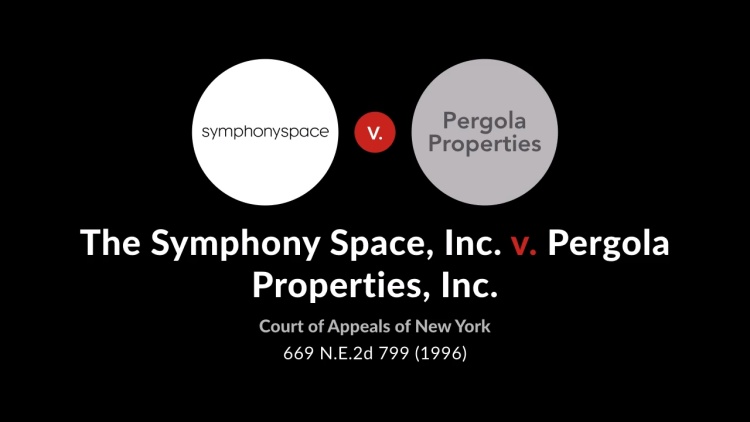The Symphony Space, Inc. v. Pergola Properties, Inc.
Court of Appeals of New York
669 N.E.2d 799 (1996)
- Written by Dennis Chong, JD
Facts
Broadwest Realty Corporation owned a set of three adjacent buildings in New York. One building included a theater space. Broadwest could not find a permanent tenant for this building, and thus operated it at a loss. In 1978, Broadwest sold the building, including the theater space, to The Symphony Space, Inc. (plaintiff) for the below-market price of $10,010. In return, Symphony Space leased the non-theater portion of the building back to Broadwest for $1 per year. In addition, Broadwest paid Symphony Space $10 for an option to repurchase the building. The repurchase option provided that Broadwest could exercise the right to repurchase as long as the closing took place in certain specific years, including 2003. Broadwest transferred its interests in the three adjacent properties, including the building housing Symphony Space’s theater space, to Pergola Properties, Inc. (defendant) and others as tenants in common. In 1987, Pergola indicated its intent to exercise the option to purchase the Symphony Space building. Symphony Space filed this lawsuit asking the court to declare the repurchase option void as against New York’s statute prohibiting remote vesting. The trial court ruled in Symphony Space’s favor. The intermediate appeals court affirmed. The intermediate court certified the question to the Court of Appeals.
Rule of Law
Issue
Holding and Reasoning (Kaye, C.J.)
What to do next…
Here's why 907,000 law students have relied on our case briefs:
- Written by law professors and practitioners, not other law students. 47,100 briefs, keyed to 996 casebooks. Top-notch customer support.
- The right amount of information, includes the facts, issues, rule of law, holding and reasoning, and any concurrences and dissents.
- Access in your classes, works on your mobile and tablet. Massive library of related video lessons and high quality multiple-choice questions.
- Easy to use, uniform format for every case brief. Written in plain English, not in legalese. Our briefs summarize and simplify; they don’t just repeat the court’s language.





